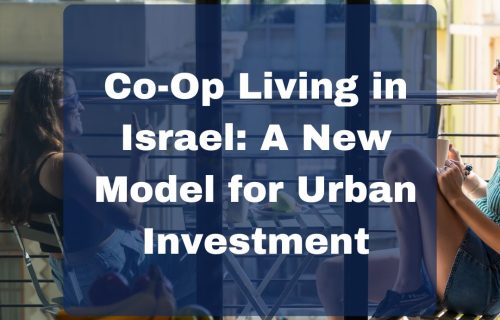How many apartments can you buy in Haifa or Beer Sheva for the price of one in Tel Aviv?
Reference: www.globes.co.il/news/article.aspx?did=1001391139
According to a recent Globes article apartment prices in Israel the third quarter jumped the annual rate of increase to 13%. These trends are not without gaps for example Tel Aviv is rising at a record rate setting it apart from the rest of the country, while in Haifa and Be’er Sheva prices are stable and investors prefer to get rid of apartments for liquidity reasons.
From the CBS data, one can clearly see the existence of the two countries that are talked about so much – the state of Tel Aviv and everything else. There are two planets here that operate in different ways, at different prices, and with completely different dynamics.
It looks like Finance Minister, Avigdor Lieberman’s estimate that apartment prices are expected to rise by 11% in 2021 currently seems very reasonable. In the last year, apartment prices have risen by 9.9%, and since the beginning of 2021, the rate of increase has been 10.5%. During this third quarter the increase has already reached 13% according to a report by the CBS.
So if the large demand for apartments, especially on the part of real estate investors, does not bounce the index up too much – the annual index of apartment prices will amount to an increase of about 11% -12%. Very similar to the latest estimates of the Minister of Finance.
On the other hand, Minister Lieberman was partially right in claiming that Israel is at the bottom of the rising scale. While Australia apartment prices have risen by almost 20% a year; In the US by 19%, in Germany by 12%, in Sweden by 11%, in Canada by 11%, but in countries such as Finland, Norway, France, Belgium and other countries the rate of price increase in the real estate market is around 5% -7 % – much less than in Israel.
So while Israel is very far from being at the top of the rises in the real estate market, it is also quite far from scratching the bottom.
Is the target aimed at the Minister, to reach price increases of 5% -6% in 2022, really reasonable? It seems that if it is achieved, it will be largely thanks to stronger forces than those of the Israeli government, led by an inflationary eruption and rising interest rates.
Zero Return on rent
At the same time, the CBS also published rental prices and apartment prices in the 16 largest cities in the country, from which it can be seen how the rate of increase in apartment prices exceeds that of rental prices. This is reflected in declining yields on apartment rentals.
In the third quarter of 2019, the average yield on renting an apartment in Israel reached 3.1%, while in the third quarter of the year it had already dropped to 2.9%.
In Tel Aviv, the yield on renting an apartment reached an average of 2% in the third quarter of the year. If rent and rent yield were the sole consideration of apartment investors – they would have long since kept their feet off the city – something that of course does not happen.
Those who invest in Tel Aviv do not look at the return, but at the rise in apartment prices. In this regard, the data are already completely different – the average price of a four-room apartment in Tel Aviv has risen by about 10% in the past year, to a level of NIS 4.03 million.
Tel Aviv “stands out” from the big cities that are behind it in the price range – in Ramat Gan, for example, the price of a four-room apartment rose by about 7%, to about NIS 2.6 million, and in Jerusalem by 6% to an average of NIS 2.4 million. Rishon Lezion four new apartment price rose only 1.2%, and Petah Tikva and Haifa there was a general fall in prices – 0.9% and 0.3% respectively.
The price of four-room apartment in Tel Aviv today would be equivalent to purchasing three similar apartments in Haifa, and almost four apartments in Be’er Sheva , and gain much higher returns (3.1% in Be’er Sheva and 2.9% in Haifa).
On the contrary. In a review by chief economist Shira Greenberg from the beginning of the week of the real estate market in September, she revealed that in the first nine months of the year the Haifa area leads the increase in investor sales, with a 42% increase in number of apartments sold, compared to 30%.
Greenberg estimated that the accelerated sale is explained at least in part by the need to increase liquidity. “In this context, it is important to note that the average holding time of the apartments sold by investors in the Haifa area is about 18 years” says the Chief Economist.
This is an interesting point, because the average apartment prices in the city have been stuck for several years, and more precisely, while in the first quarter of 2017 the average transaction price for an apartment made in the city reached almost NIS 1.2 million, in the third quarter of 2021 it reached only NIS 1.16 million.
In Be’er Sheva, the situation is slightly better: in the first quarter of 2017, the prices of apartments in the city reached an average of NIS 983,000, and in the third quarter of the year they rose to NIS 1.03 million. An increase of 5% in four years is not considered a real estate success story these days. In Tel Aviv, on the other hand, the average price of an apartment rose in those years by 22% to NIS 3.44 million.
Two real estate planets:
This factor, of such large price differences between the Israeli real estate capital and the peripheral capitals, also determines a completely different type of investor. An investor who bought an apartment in Tel Aviv two months ago paid an average of NIS 3.9 million – four times more than investment apartments purchased in Be’er Sheva and Haifa. The rental yield really did not interest him.
The low prices in peripheral cities may be an attraction for investors looking to buy cheap apartments – indeed Haifa and Be’er Sheva are among the top cities sought by investors – but unlike Tel Aviv, where investors are not in a hurry to sell apartments, in Haifa (as well as in Be’er Sheva) the considerations are different. And the apartments are more liquid.
It is likely that one of the reasons for the relative stagnation in prices in Haifa and Be’er Sheva is that thousands of discounted apartments have been and are being built within the neighboring cities, as part of the “price per occupant”, which affects the moderation in apartment and rental prices.
The result of this is the formation of certain investor markets in the expensive cities in the center of the country, especially Tel Aviv, Ramat Hasharon and Raanana, which in September were visited by more investors than young couples who purchased their first apartment. Compared to the cities on the periphery of Haifa and Beer Sheva, where two young couples bought apartments for every investor who bought an apartment. Literally two separate real estate planets.
Where will the young couples go?
The obvious question is, in light of this data and the existence of two markets that talk very little to each other, a uniform policy towards investors is the right thing to do. Because with such high prices on the Tel Aviv planet – it is difficult to see how young couples will be able to benefit from raising the tax on investors.
The deeper question is, how can these two planets be returned to the same country. Hundreds of thousands of square meters of employment areas are currently being built from Ramat Hasharon in the north to Rishon Lezion in the south, which will ensure the continuation of Tel Aviv hegemony for decades to come. Spring, while it is difficult to see any vision for the periphery, other than its continued existence as a warehouse of housing units for young couples and the public that will not be able to afford the prices of Tel Aviv apartments.
**The contents of this article are designed to provide the reader with general information and not to serve as legal or professional advice for a particular transaction. Readers are advised to obtain advice from qualified professionals prior to entering into any transaction.




